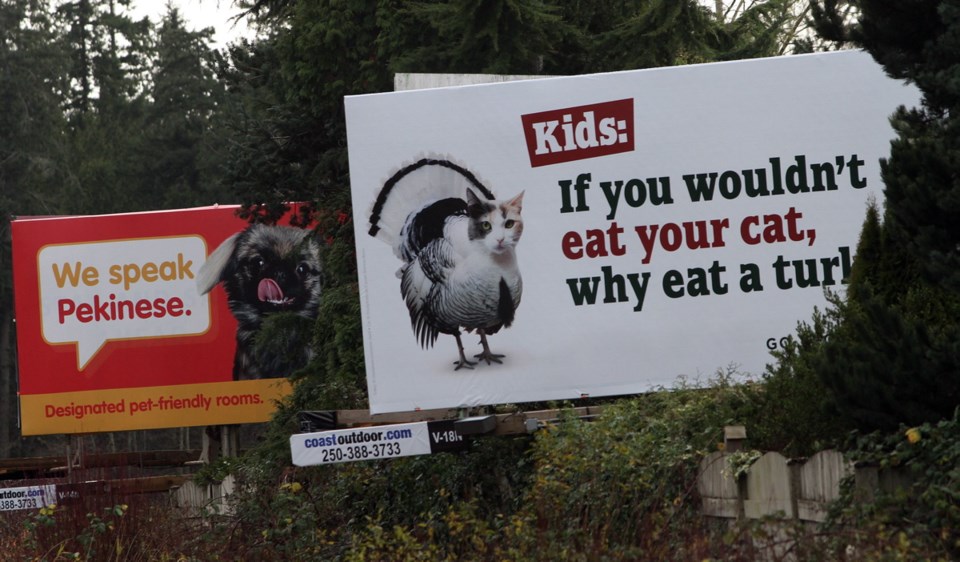A new billboard on the Patricia Bay Highway is asking kids to care about the Christmas turkey like they do for the family cat.
It reads: “Kids: If you wouldn’t eat your cat, why eat a turkey? GO VEGAN.”
The image depicts an animal that is a cross between a cat and a turkey.
The billboard, the first of its kind in Canada, is part of a provocative new campaign launched by People for the Ethical Treatment of Animals and is meant to prompt conversations between children and their parents, PETA spokeswoman Danielle Katz said.
“We figured Christmas is right around the corner, and we decided to place this billboard to spark a conversation about animals and inspire families to try a delicious, cruelty-free vegan Christmas meal this year,” Katz said Monday.
“We’re always looking for places to bring our messages of kindness toward animals.”
Children are constantly bombarded with fast-food ads, Katz said. “Our goal is simply to offset some of that negative influence.”
Children would feel differently about eating turkey if they knew how they were raised, Katz said.
“Even though we may not be as familiar with turkeys as we are with cats and dogs, these animals suffer every bit as much when they’re beaten and abused,” she said.
Comparing pets to farm animals “is a ridiculous proposition,” said Michel Benoit, general manager of the B.C. Turkey Association, which has 64 members and represents the province’s registered turkey farmers.
“Pets are bred to be companion animals and farm animals are meant to feed us.”
The B.C. turkey industry has codes of practice that were developed with veterinarians and animal welfare groups such as the Canadian Federation of Humane Societies, Benoit said.
PETA said in a statement that “most turkeys slated to be killed for food are crammed in filthy warehouses, where disease, smothering and heart attacks are common.”
Benoit said that’s not the case for his member farms. There are videos on the association website that show how the birds are cared for at the biggest farm in the group, a Fraser River operation that has 60,000 turkeys at any one time.
The marketing strategy of targeting children can backfire, said Brock Smith, a professor of marketing and entrepreneurship at the University of Victoria.
“I have no problem with provocative. What I have a problem [with] is when it’s directed at kids — I think that’s inappropriate,” Smith said after seeing the billboard on Sunday.
Smith said his reaction was : “Oh my gosh, what kind of a message is that before Christmas?”
He said he believes PETA is going for the shock value to get people talking.
“They’re probably under the opinion that any publicity is good publicity, but I think it’s unfortunate they were targeting children in particular.”



